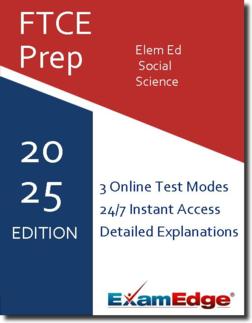FTCE Elem Ed - Social Science (602) Practice Tests & Test Prep by Exam Edge - Additional Information
Based on 40 Reviews
- Real Exam Simulation: Timed questions and matching content build comfort for your FTCE Elem Ed - Social Science test day.
- Instant, 24/7 Access: Web-based FTCE Elementary Education K-6 - Social Science practice exams with no software needed.
- Clear Explanations: Step-by-step answers and explanations for your FTCE exam to strengthen understanding.
- Boosted Confidence: Reduces anxiety and improves test-taking skills to ace your FTCE Elementary Education K-6 - Social Science (602).



